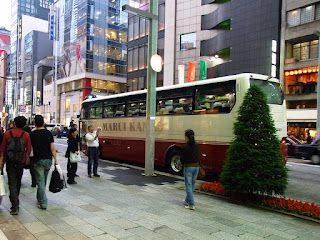Yesterday (Sun 15th) commemoration services were held to mark the 65th anniversary of the end of World War Two. The biggest is held at the Budokan in Kita no Maru park in Tokyo and is attended by the Emperor, PM, various politicians, government officials and family members of former soldiers. It's a solemn day with pledges all round (including from the Emperor) that Japan is committed to peace and war must not happen again.
In keeping with the spirit, as a conciliatory gesture, Prime Minister Kan declined to pay respects at the controversial Yasukuni shrine (more on that another time) *, a gesture no doubt appreciated in China and Korea, where the stubborn visits of PM Koizumi in the mid 90s created a great deal of angst and escalated tensions. (see picture below)
In keeping with the spirit, as a conciliatory gesture, Prime Minister Kan declined to pay respects at the controversial Yasukuni shrine (more on that another time) *, a gesture no doubt appreciated in China and Korea, where the stubborn visits of PM Koizumi in the mid 90s created a great deal of angst and escalated tensions. (see picture below)
 |
| Protests against Yasukuni visits in Hong Kong "Shame on Japanese Militarism" 1. |
 |
| Japan, China, Manchuria, with co-operation there will be great peace on earth (China on the RHS, Manchuria on the LHS). |
When Japan occupied Korea and then Manchuria, arguably it was doing nothing different to what other colonial powers were doing at the time. Actually, I raised an eyebrow last night at a 1932 news reel of Lord Lytton (the man charged by the League of Nations with investigating Japanese occupation of Manchuria) speaking sternly about how Manchurians didn't want the Japanese ruling them - I guess the irony of British India and the 1930 Salt March was lost on him... but I digressed to a soap box....**
Japan in the 40s embraced the rhetoric of the 'Great East Asian Co-Prosperity Sphere'. The picture on the right typifies the sentiment - happy China & happy Manchuria relying on responsible and noble Japan to lead them forward. 'The co-operation of Japan, China and Manchuria brings great peace to the world'. In South East Asia the Japanese Imperial Forces boasted that they were liberating SEA from the yoke of European colonialism. There was no question that anyone but Japan, the benevolent, would be in charge.
 |
| Japan 'liberating' South East Asia |
Walking around Tokyo these days, more than ever it feels that the idea of a genuine Asian co-prosperity sphere is actually emerging, one that has co-dependence rather that exploitation as its core.
 |
| Mainland Chinese tourist sightseeing bus in Ginza |
Chinese tourists are moving beyond the cities to onsens. ski fields and historical. & religious sites.
The university where I teach is one of many that have started to offer Mandarin as one of its second foreign languages.
 |
| Daikokuya Okachimachi with Union Pay |
The changing situation has the potential to be good for both sides. Last week, to the dismay of many - particularly on the right, it was announced that China has overtaken Japan as the world's second biggest economy, a logical development since China has close to ten times the population. PM Kan makes a refreshing change from some of his belligerent predecessors, one can hope that goodwill can extend through out the region for better political relations to accompany changing economics. One can also hope that closer contact will have the potential to stop Japan slipping further into economic malaise.
 |
| Union Pay - the Chinese credit card |
Picture 1. Anti Japan protests in HK following Koizumi's visit to Yasukuni "Shame on Japanese Militarism"
http://www.chinadaily.com.cn/english/doc/2005-10/17/content_485604.htm
2. With the cooperation of Japan, China and Manchuria, there can be great peace on earth. (the flags are imperial China and Manchuria, Japan in the centre)
http://www.chinadaily.com.cn/english/doc/2005-10/17/content_485604.htm
3. Mighty Japan liberating SEA.***http://www.seasite.niu.edu/crossroads/aneher/warinsea_slbs.htm
* I'll write more about Yasukuni at some point in the future. But in short, it's a Shinto Shrine in central Tokyo where the souls of all soldiers who died fighting for Japan are enshrined (whether or not they want to be). This includes war criminals who were specifically enshrined in ceremonies in 1959 and 1978.
** I am not a Japanese right winger in disguise as a foreigner, but I still find this quite ironic.
** I am not a Japanese right winger in disguise as a foreigner, but I still find this quite ironic.
No comments:
Post a Comment